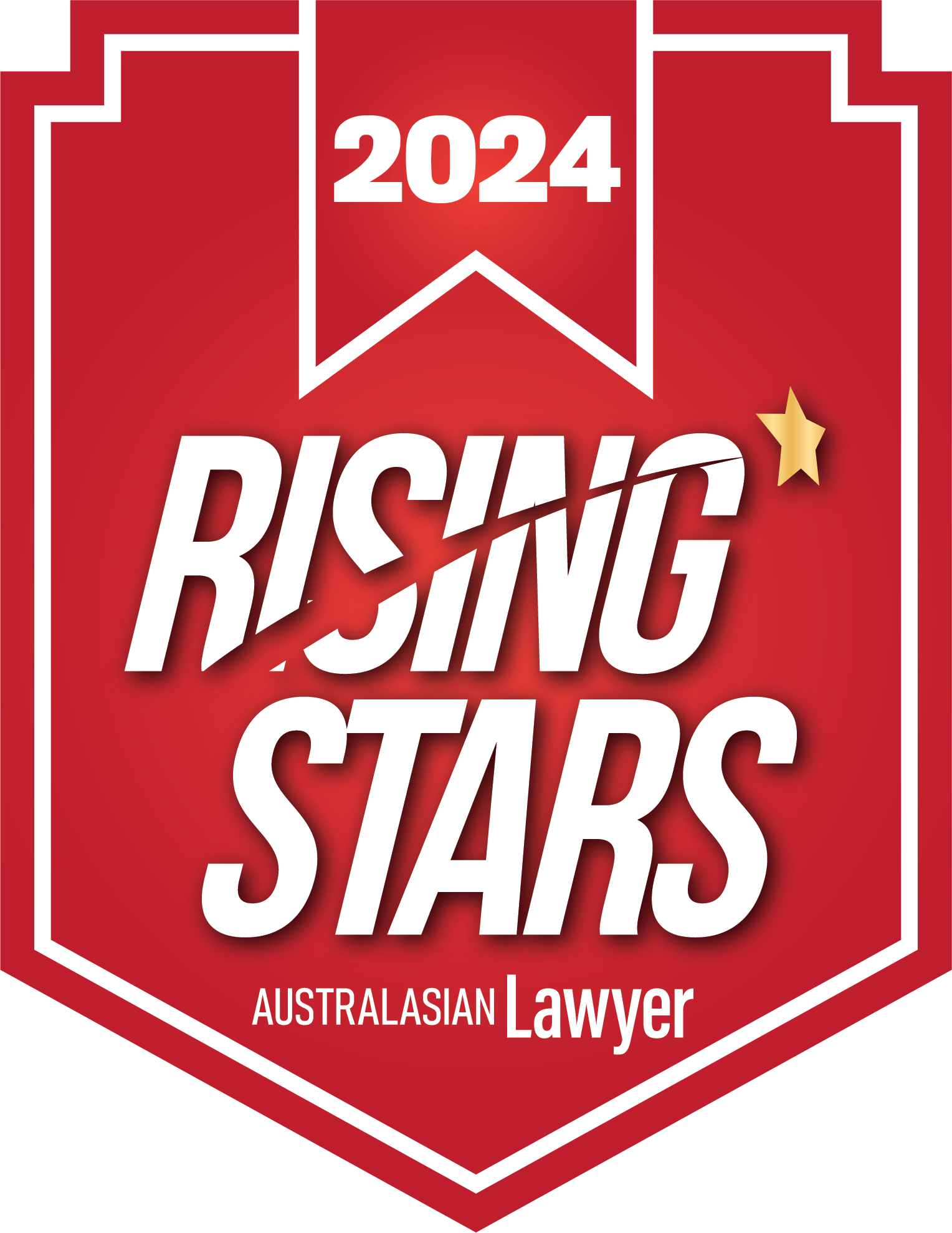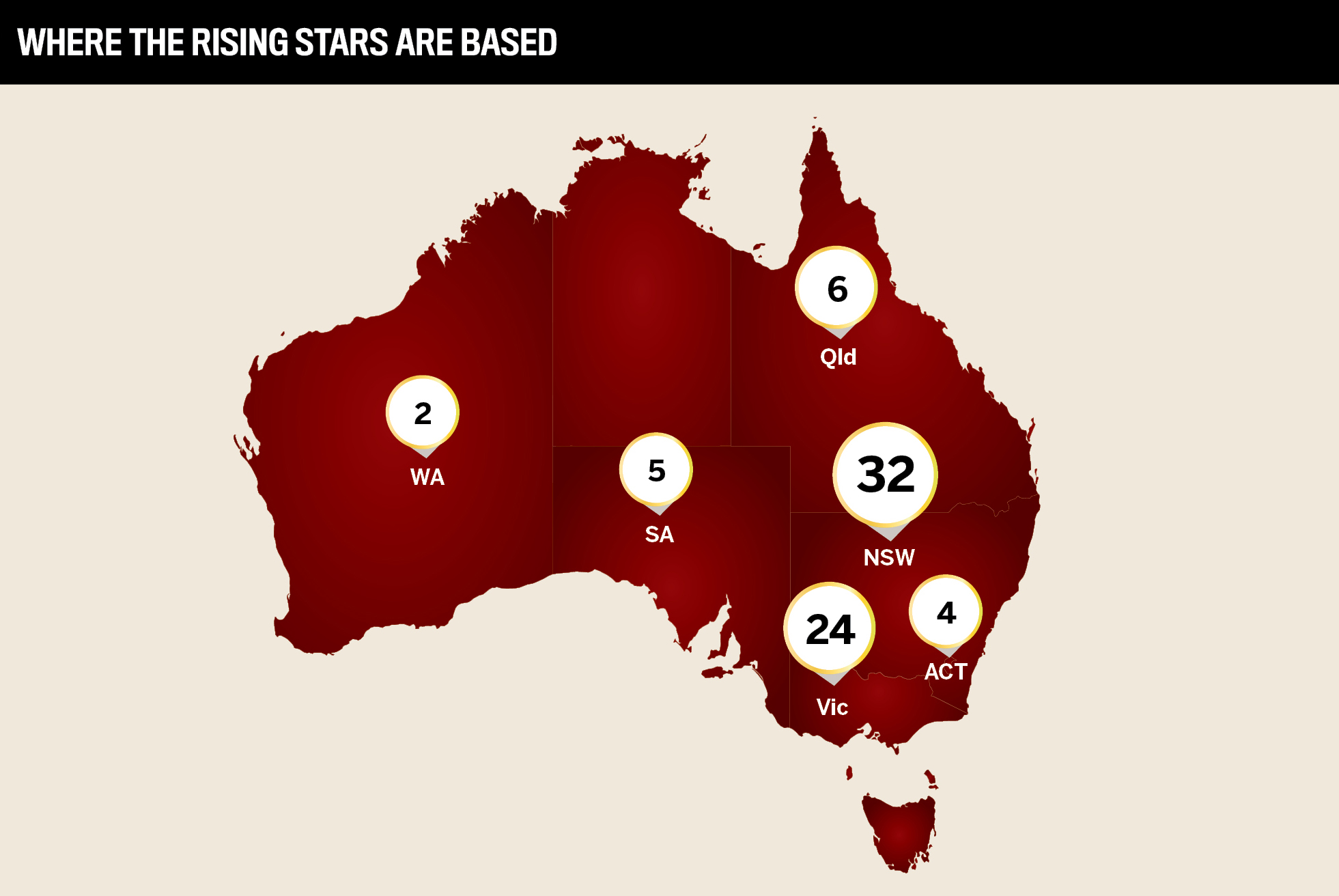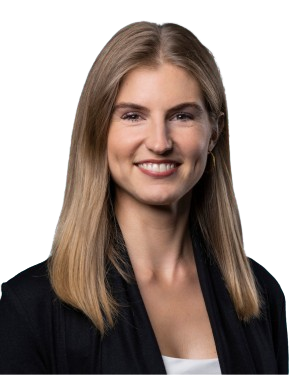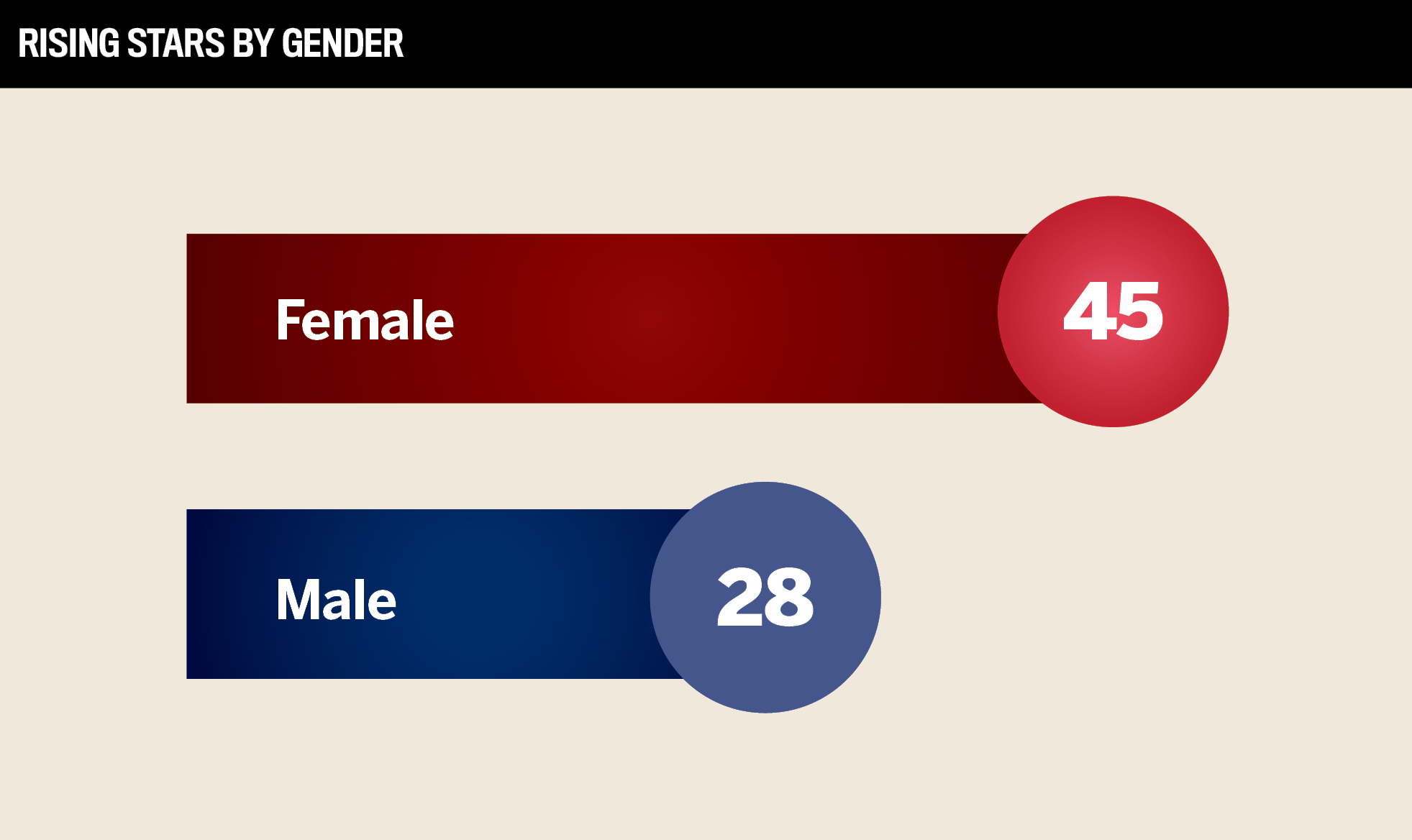

Jump to winners | Jump to methodology
Australasian Lawyer’s fourth annual Rising Stars list celebrates young professionals aged 35 and under who have made remarkable contributions to the legal sphere. Their dedication to the industry and unwavering commitment to client service distinguish them as leaders.
Reflecting on what makes the best young lawyers stand out, Jesse Shah, founder and CEO of legal recruitment firm nrol, says, “The junior market has lots of candidates; that’s why it’s important to have a passion for the law. There’s lots of competition.”
Shah highlights the importance of motivation for younger professionals.
He says, “Law is a very traditional industry; they have to be very clear in the areas they want to practice in and have passion for that area.”
The Rising Stars of 2024 have stood out in such a competitive landscape with their dedication to their craft and ability to deliver for clients.

An exceptional commitment to client success saw her made partner three years ago, and it is a testament to her foresight and passion to drive the legal profession forward.
Previously recognised as a Rising Star in 2022 and 2023, this best young lawyer has her sights firmly set on the next stage. Soon to be named an equity partner, she is relishing the opportunity to step back from daily client interaction to focus on big picture objectives.
Zhou has spearheaded the firm’s expansion into Asia, notably Malaysia, the Philippines and China. She is also finalising plans to establish a satellite office in Singapore.
“This has been in the works for some time because I’m originally from there, so I’ve got the connections and the network. It’s a popular place to expand because it leads to the rest of Asia,” she says. “We have partners and joint ventures with law firms there, as well as other professionals such as immigration agents and accountants, to provide more of a concierge service for our clients who want to have international work done.”


Innovation is a constant pursuit for Zhou. She envisions a decentralised justice system and, as a byproduct, is propelling Quantum into the metaverse.
Zhou aims to revolutionise the lengthy and costly process of legal disputes by digitising them. She foresees a system where clients acquire dispute credits in digital currency to arbitrate specific matters. These credits would be linked to smart contracts, enabling automatic fund release and eliminating lengthy wait times.
She says, “Through my work, I aim to add value to society, and I think technology can help scale that. If we can make things easier in terms of resolving disputes in this way, I think it’s going to be a huge benefit to the world.”
Specialising in real estate, commercial law and technology, Zhou handled $870 million in transactional and advisory deals between 2022 and 2023.
Some of her standout projects are:
reducing a $5 million claim against a construction company to $400,000
devising an innovative approach for a foreign investment application to expedite a $30 million transaction for an international construction firm
resolving disputes with a high-value real estate acquisition exceeding $100 million, allowing for a settlement to take place
As a young female partner, Zhou has grown accustomed to leveraging underestimation to her advantage.
“On first impression, clients don’t know I’m all this and that, which is quite refreshing because when I do advise on things, they are pleasantly surprised, and the impact is larger,” she says.
As one of the nation’s best young lawyers, Carter channels her proud Indigenous heritage to address legal issues impacting her community. As a solicitor specialising in Indigenous Cultural and Intellectual Property (ICIP), she reconciles contradictions between modern copyright law and indigenous customary law, where knowledge does not belong to an individual but is communally owned.
As part of this work, Carter has:
assisted in drafting a submission to the Joint Standing Committee on Aboriginal and Torres Strait Islander Affairs regarding the implementation of the United Nations Declaration on the Rights of Indigenous Peoples and its relationship with the Uluru Statement from the Heart
advised on the protection of cultural knowledge in the native foods and botanicals industry in collaboration with the Federation of Victorian Traditional Owner Corporations, drafting a document setting benchmarks to ensure cultural protocols were protected
“If you want to make products that contain bush foods, recognising First Nations people for their knowledge, where you’ve gotten that knowledge, and which community it has come from, is really important,” says Carter.


The solicitor also leads development initiatives at Terri Janke, such as Guarding Governance, a professional workshop designed to assist executives and directors in developing their capacity-building skills, with a particular focus on Indigenous governance systems.
Carter says, “Not only am I advising First Nations people, but I’m also advising non-Indigenous people in organisations who want to understand, in best practice, what it means to be appropriate and respectful when I engage with First Nations people.”
Motivated by the desire to address the absence of Indigenous representation in the legal field, Carter is committed to using her legal expertise to empower and uplift her community.
“My dream would be to give them everything I know – six years of law school and practical legal training,” she says. “If I become obsolete because my community is so empowered with that knowledge, that would make me excited for the future.”
The senior associate stands out for her dedication to pro bono work and expertise across medtech.
This specialised knowledge has enabled Pryor to:
advise Foundation Medicine on a multi-jurisdictional patent dispute concerning its next generation diagnostic for the analysis of tumour alterations
direct pharmaceutical company Takeda on its enforcement strategy for its multiple myeloma drug Velcade
guide a leading medical research institute on a licence agreement with a global biopharmaceutical company
Reflecting on the latter case, completed in 2023, she says, “I learned a lot about project management because I was overseeing the operation of the team. I really learned how to get the best out of people. I’m a big believer in allowing people to work in the way that suits them best.”


Acknowledging how instrumental mentorship has been in her journey, Pryor hones her leadership skills through participation in Toastmasters, an international nonprofit dedicated to building public speaking skills.
She says, “Through that, I’ve had the opportunity to receive a lot of mentorship and guidance and learn how to be a better mentor.”
Pryor focuses on uplifting those who are not able to obtain legal counsel through her pro bono commitments. Since January, she has completed 70 hours, exceeding Maddocks’ 35-hour annual target.
Some of her notable recent cases are:
offering initial IP counsel to a global animal welfare charity for their campaign exposing the cruelty of dolphins in captivity
assisting refugees in obtaining visas to remain in Australia
“It’s incredibly rewarding. Often, one of the highlights of my week is the time that I spend doing pro bono work,” says Pryor. “Being in a position of privilege, we have an imperative to give back to people who might otherwise not be able to pay for legal advice. I think that’s a central tenet of the legal system.”
By blending legal skills with a passion for technology, Adason has created a unique role. As an associate director, he offers clients advice on business and tax issues while also devising strategic initiatives to enhance Aptum’s operations.
He says, “Managing clients is not my strong suit. I’ve instead become a specialist resource that can be dropped into projects, like an internal junior counsel.”
Adason’s career highlights include:
crafting a freezing order application against an Australian Securities Exchange-listed entity amid a significant dispute in the oil and gas industry, where he was responsible for preparing the supporting evidence
handling proceedings in the New South Wales Supreme Court involving a property development dispute valued at approximately $50 million, where he prepared pleadings and witnessed evidence in-house
Adason’s previous role was that of the firm’s head of innovation.
“I’ve got a fairly big interest in the way that we practice and looking at how that can be improved and tweaked by the addition of technology,” he says.


Adason actively shares this information with his professional community, presenting at the following panels and workshops in 2023:
Legal Innovation & Tech Fest in Sydney: embracing new technology to streamline law firm operations
Centre for Legal Innovation’s Future Firm, Future Fit Workshop: sharing insights to enhance the client experience
Playing a central role in the architecture of Aptum’s approach and internal processes, Adason has introduced workflow management tools such as:
Jira
MatterX
Everchron
His contribution has enabled the rest of the firm’s lawyers to be more efficient.
“We have standard platforms across every project from day one, so the lawyers who are working on it don’t have to spend time understanding the context,” says Adason. “They can just jump from one project to another without having to worry about that context-switching downtime.”
AL delved into the goals and targets of this year’s Rising Stars by asking, “Envisioning the culmination of your career, what do you hope to have accomplished?”
Zhou: “I think what’s beautiful about life is that it’s always changing. I’ve got short-term goals, but at the end of my career, I would like to have changed the world by making a mark on how legal processes operate, and I think technology will play a large role in that.”
Carter: “My goal is for an empowered community where my role becomes redundant. I hope my children and my children’s children can grow up in a world where Australia recognises them, values them and respects their rights and culture. Through the work that I do in advocating for the protection of ICIP rights, I can see this future for my people.”
Pryor: “My goal is to continue building my practice as a go-to IP lawyer in the life sciences space, assisting clients to commercialise their intangible assets and defend or bring proceedings where necessary. Continuing to contribute to Maddocks’ pro bono initiatives will also remain a priority for me. I hope to look back on a career in which I’ve developed enduring relationships with my clients and colleagues and have helped to mentor the next generation of IP lawyers.”
Adason: “I want to have made a meaningful impact on the profession, in particular on the way civil disputes are run – to somehow help move the needle towards making it a better process for both clients and practitioners.”

Last November, Australasian Lawyer accepted nominations for the 2024 Rising Stars list. The standout young stars from the Australian legal profession were invited to put their names forward; those who knew of and wished to highlight such talent were also asked to submit nominations.
Nominees needed to be 35 or younger as of 31 March 2024. They had to have committed to a career in the legal profession and shown a clear passion for the industry. The Australasian Lawyer team also required nominees to cite their current position, responsibilities and key achievements over the past 12 months.
The team considered recommendations from managers and senior industry professionals in the review process conducted after the nomination period. After considering all aspects of the many submissions received, 73 emerged as the brightest young stars of the batch.